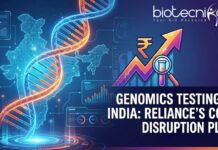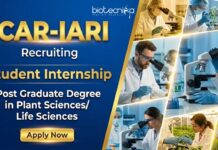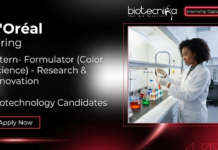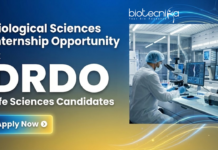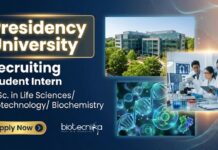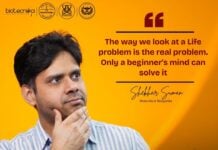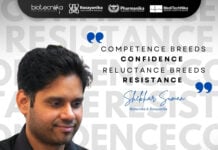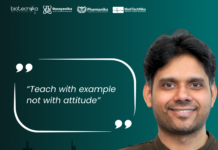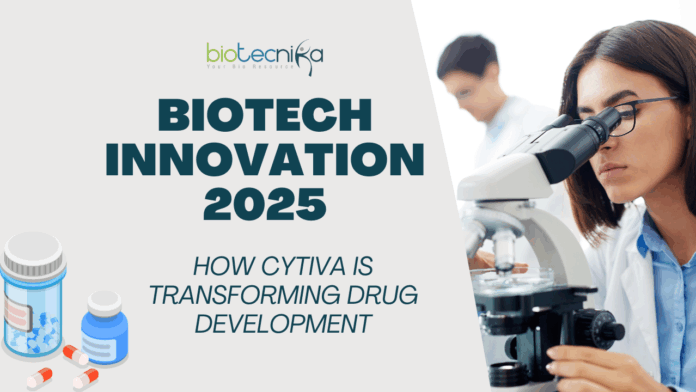Biotech Innovation 2025: How Cytiva Is Transforming Drug Development
Drug discovery is often described as a race against time, diseases, failure and odds. For Paul Belcher of Cytiva, that race became strikingly real on a flight out of Boston. Sitting beside a man whose son was being treated for a rare genetic disease, Belcher realised the therapy giving that family hope relied on a safety test he had helped develop. In that moment, the immense pressures of drug discovery crystallised into something personal: behind every workflow and assay lies a patient’s future.
The Unseen Backbone of Drug Development
Drug discovery has never been simple. A decade ago, only one in 10,000 compounds made it from the lab bench to clinical trials. Today, despite leaps in science, the odds remain daunting. Failures in efficacy, safety, and scalability slow progress. What companies need are efficient workflows, systems that can weed out weak candidates early and accelerate promising ones toward the clinic.
This is where Cytiva steps in. Established in 2020 after Danaher acquired GE Healthcare’s life sciences division, Cytiva has quickly established itself as a global leader in biopharma tools and expertise. Its portfolio spans well-known systems like ÄKTA chromatography platforms and Biacore surface plasmon resonance technology, both vital to understanding molecular interactions at a level of precision that can make or break a therapy’s future.
But Cytiva isn’t just selling instruments. Belcher and his colleague, product innovation lead Martin Teichert, describe the company as a partner that anticipates bottlenecks before their customers even identify them. Teichert says that their role is to help compress timelines, maximise information from precious samples, and even integrate different technologies into a single step.
Meeting the Industry’s Five Big Challenges
Through close collaboration with customers and extensive research, Cytiva has identified five pressing needs shaping the future of drug discovery:
- Compressing timelines – Screening more molecules, faster, with robust automated assays.
- Managing complex targets – Developing miniaturised tools that can do more with limited samples.
- Maximising data output – Extracting richer insights from every experiment for faster, better decisions.
- Workflow integration – Combining multiple technologies into fewer steps to save time and reduce risk.
- Harnessing AI – Standardising and pooling data into accessible “data lakes” for smarter drug design.
The last of these AI has been a major focus. About five years ago, Cytiva introduced an AI-driven analytics tool that slashed the time needed to process large datasets by 90 percent. Interestingly, customers had not asked for it. Belcher recalls that they simply accepted that data crunching was slow. He further adds that Innovation often means solving problems people don’t even know they have.
Partnerships Driving Breakthroughs
Cytiva’s collaborations extend beyond its customer base. In partnership with UK-based biotech Nuclera, the company is tackling one of drug discovery’s most stubborn bottlenecks: producing proteins for testing drug targets. Traditionally, generating and characterising protein constructs takes months. But Nuclera’s benchtop system, powered by AlphaFold AI, and Cytiva’s Biacore platform can now complete this process in mere days.
This fusion of AI-driven design and high-speed molecular analysis exemplifies the direction the industry is heading, smarter, faster, and more integrated.
The Human Dimension
Despite the sophisticated technologies, the heart of Cytiva’s mission lies in patient impact. Whether it is a rare disease therapy or a mainstream drug, the ultimate goal is the same: to bring effective treatments to people sooner. For Belcher, that reminder came mid-flight, in a simple conversation with a father full of gratitude.
Belcher reflects that it showed him the real human side of what we do. He expresses these emotions by saying that now he can retire happy knowing that he played a part in that.
As the pace of drug discovery quickens, one thing is clear: the future will lean heavily on AI and automation, but it will always need the vision of scientists and the lived experiences of patients. For Cytiva, this Biotech Innovation 2025 is bridging that gap between data and humanity, has become both its challenge and its calling.





